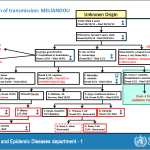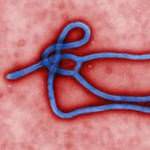Patient Zero dies
 Patient Zero, a two-year-old boy dies a few days after falling ill in a village in Guéckédou, a village in southeastern Guinea that borders Sierra Leone and Liberia. A week later, the virus kils the boy’s mother, then his three-year-old sister, then his grandmother. All have symptoms of the virus, including fever, vomiting and diarrhea, but at the time, no one knew what had made them ill. Two mourners at the grandmother’s funeral take the virus home to their village. A health worker carries it to another village, where he dies, as does his doctor. They both infect relatives from other towns. WHO releases the chart of infection in August 2014.
Patient Zero, a two-year-old boy dies a few days after falling ill in a village in Guéckédou, a village in southeastern Guinea that borders Sierra Leone and Liberia. A week later, the virus kils the boy’s mother, then his three-year-old sister, then his grandmother. All have symptoms of the virus, including fever, vomiting and diarrhea, but at the time, no one knew what had made them ill. Two mourners at the grandmother’s funeral take the virus home to their village. A health worker carries it to another village, where he dies, as does his doctor. They both infect relatives from other towns. WHO releases the chart of infection in August 2014.
Sierra Leone locks down
Sierra Leone declares a 4-day lockdown from the 18th to the 21st of September 2014. This is in a bid to tackle the Ebola outbreak in the country. The aim of the move is to allow health care workers to isolate new cases and prevent the disease from spreading further. Health workers will be given vaccines in November, after safety checks have been completed.
Umar Khan dies of Ebola
Khan dies after contracting Ebola. Chief medical officer Dr Brima Kargbo:
It is a big and irreparable loss to Sierra Leone as he was the only specialist the country had in viral haemorrhagic fevers.
Doctors without Borders:
His work and dedication have been greatly appreciated by the medical community in Sierra Leone for many years. He will be remembered and missed by many, especially by the doctors and nurses that worked with him. MSF’s sincere thoughts and condolences are with Dr. Khan’s family, friends and colleagues.
Antibodies from survivors
Researchers consider using blood transfusions from Ebola survivors to pass antibodies into infected people, as no vaccines or drugs are approved yet. Dr. Peter Piot, director of London’s School of Hygiene and Tropical Medicine and co-discoverer of the virus:
This is something that’s fairly simple to do
WHO’s network of international blood regulators says there are thousands of survivors from past Ebola outbreaks in Africa. It says it has identified several patients as possible donors and the first batch of blood from survivors could be available later in the year, but adds:
[The] logistics of blood collection are an issue
Blood from donors must also be screened for other illnesses such as HIV and malaria before it can be used.
CDC concerned about spread
The CDC is now concerned about the risk of Ebola spreading beyond Guinea, Nigeria, Sierra Leone and Liberia. Dr. Skinner, an infectious disease specialist from the organization, says that travelers could unknowingly transfer the deadly virus beyond more international borders. Dr. Rob Dretler, CDC:
We know what to do and can completely isolate them but someone coming home who doesn’t know they are sick and is here a few days and gets sick, that’s the risk.
Pledges $200 million
The World Bank pledges $200m in emergency aid to Liberia, Guinea and Sierra-Leone, in a bid to counter further spread of the deadly virus. Jim Yong Kim, the president of the World Bank, says that he is ” deeply saddened” by the progress of the epidemic thus far. The funds will be used to undertake numerous relief activities including providing medical supplies, paying staff and driving a campaign that will contain the epidemic.Yong Kim:
I have been monitoring (Ebola’s) deadly impact around the clock and I’m deeply saddened at how it has ravaged health workers, families and communities, disrupted normal life and has led to a breakdown of already weak health systems in the three countries.
Arrives in US
Writebol, the second American who contracted Ebola while working with a missionary group in Liberia, is airlifted to Emory hospital in Atlanta for treatment. The aid worker, 59, is the second American to be flown into the US for treatment. David Writebol:
Now we have a real reason to be hopeful.
Nigeria: State of Emergency
Nigeria declares a State of Emergency after seven cases of Ebola are confirmed in the country after a man arriving from Liberia fell sick. Two of the confirmed cases die while several people who have come into contact with the man are under surveillance.
Hiding patients illegal
Sierra Leone has voted to pass an amendment to its Health Act whereby people caught hiding Ebola patients could face possible jail time of up to two years. The amendment still needs to go for presidential approval. The country has been hit hard by the current outbreak with at least 392 deaths and 910 cases recorded.
Sierra Leone majority leader Ibrahim Bundu:
[Sierra Leone has suffered] abandonment and isolation from those we viewed to be our biggest friends in the region and beyond. These ugly developments are evidenced in the cancellations of flights, closing of borders, reduction of operational hours of banks and further isolation by shutting down businesses at the time of greatest need.
He said lawmakers would soon review the country’s partnerships “so as to form a permanent record of who are true friends are.”
Pledges Ebola funds
The Bill and Melinda Foundation pledged $50 million to help fight the Ebola outbreak in West Africa. The money will be used to help the government purchase supplies, “scale up emergency operations,” and enable international aid.
We are working urgently with our partners to identify the most effective ways to help them save lives now and stop transmission of this deadly disease. We also want to accelerate the development of treatments, vaccines and diagnostics that can help end this epidemic and prevent future outbreaks.
British man dies in Macedonia
The Foreign Office is investigating reports that a 57-year-old British man has died and a second man, aged 72, is ill in Skopje. Macedonian officials say the the patients had been staying at a hotel when they fell ill. The now-deceased man was admitted to the Clinic for Infectious Diseases around 3 p.m. (9 a.m. Eastern) and died around two hours later. His friend remains under observation at the hospital and medical staff are attempting to confirm whether they were infected with Ebola.
Thomas Eric Duncan dies of Ebola
Duncan is pronounced dead at 7:51 a.m. at Texas Health Presbyterian Hospital Dallas, where he was admitted Sept. 28 and has been kept in isolation. Texas officials are monitoring 10 people who had direct contact with him while he was symptomatic, as well as 38 others who may have had contact. None have shown symptoms of the disease to this point. They will be monitored for 21 days, the normal incubation period for the disease. Hospital:
Mr. Duncan succumbed to an insidious disease, Ebola. He fought courageously in this battle. Our professionals, the doctors and nurses in the unit, as well as the entire Texas Health Presbyterian Hospital Dallas community, are also grieving his passing. We have offered the family our support and condolences at this difficult time.
Warns against traditional remedies
The UN body says practices like rubbing a patient’s body with limes and onions or drinking saltwater are ineffective against the virus, and warns against fake vaccines and cures.
Decades of scientific research have failed to find a curative or preventive agent of proven safety and effectiveness in humans, though a number of promising products are currently under development. All rumours of any other effective products or practices are false. Their use can be dangerous. In Nigeria, for example, at least two people have died after drinking salt water, rumoured to be protective.
Toddler dies in Mali
Two-year-old Fanta Kone dies after contracting the virus. Her grandmother traveled more than 600 miles from back to Mali from southern Guinea after her father died of the virus there. WHO:
The child’s symptomatic state during the bus journey is especially concerning, as it presented multiple opportunities for exposures – including high-risk exposures – involving many people.
Martin Salia dies from Ebola
Salia dies at Nebraska Medical Center while being treated for Ebola. Dr. Phil Smith, medical director of the hospital’s biocontainment unit:
It is with an extremely heavy heart that we share this news. Dr. Salia was extremely critical when he arrived here, and unfortunately, despite our best efforts, we weren’t able to save him.
11th Sierra Leone doctor dies
Dr. Victor Willoughby, 67, who tested positive for Ebola on Saturday, dies from the virus hours after an experimental drug arrived in the country for him. Dr. Brima Kargbo, the country’s chief medical officer:
Dr. Victor Willoughby was a mentor to us physicians and a big loss to the medical profession. He has always been available to help junior colleagues.
Health worker evaluated
An American health worker, possibly exposed to Ebola in Sierra Leone, enters the University of Nebraska Medical Center for evaluation and testing. Taylor Wilson, hospital spokesman:
There will be 21 days of monitoring and if the disease does develop, obviously treatment would begin pretty quickly.
Liberia exposure
Eight healthcare workers are being sent home due to Ebola exposure from S.D. Cooper Hospital in Monrovia. They will be under heavy observation for 21 days. This number still remains far lower than last year when the West African nation had the worst outbreak in history. To this date, Liberia reports 3,900 Ebola deaths according to the World Health Organization. Assistant Health Minister for the country, Nyenswah states:
You cannot be under observation and then at the same time go to work to expose people. No way.
Promising Ebola drug
An experimental antiviral drug, called favipiravir, is still in early stages in West Africa, and too few people have been treated to really know whether the drug helps shows some promise in the fight against Ebola in West Africa. It is only effective, however, if patients get it early. The survival rate of 85% in the ones who have received it is encouraging. European Commission for Research Moedas:
If these results are confirmed by the ongoing clinical trial, it will be the first-ever treatment to be deployed against this deadly disease during the current outbreak.
WHO can’t handle Epidemics
A 28 page report by a panel led by Dame Stocking says the World Health Organisation unable to handle public health emergencies judging from its performance in the Ebola epidemic. The report suggests fault in WHO’s financial preparedness, reliance on diplomacy, and lack of decisive actions by director general Chan. Furthermore, the report recommends regional and country representatives to play a more active role in pushing their governments to take immediate action to epidemics; this is in response to WHO’s delayed declaration of an Ebola crisis only after the death of 1,000 people.
WHO does not currently possess the capacity or organisational culture to deliver a full emergency public health response.
WHO accepts the report’s criticism and prepares improvements to its workforce and financial reserves. Medecins Sans Frontieres Dr. Liu:
The question is how will this translate into real action on the ground in future outbreaks?


